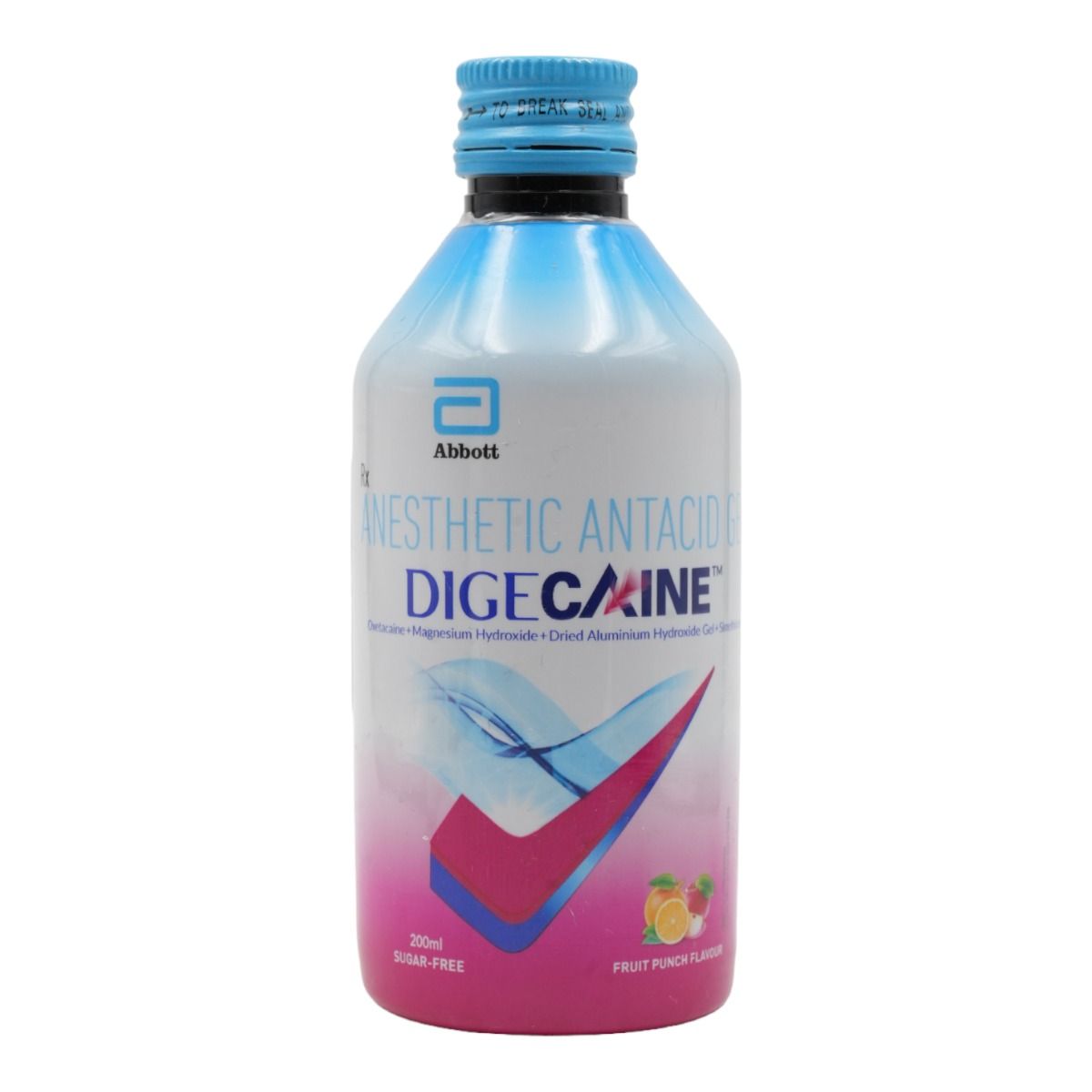Digecaine Syrup 170 ml
₹193.1*
MRP ₹214.5
10% off
₹182.32*
MRP ₹214.5
15% CB
₹32.18 cashback(15%)
Free Delivery
With Circle membership
(Inclusive of all Taxes)
This offer price is valid on orders above ₹800. Apply coupon PHARMA10/PHARMA18 (excluding restricted items)
Know Your Delivery Time
Provide Delivery Location

Selected Pack Size:170 ml
170 ml ₹193.1
(₹1.14 / 1 ml)
In Stock
200 ml ₹193.1
(₹0.97 / 1 ml)
In Stock
Whats That

Secure Payment

India's Most Trusted Pharmacy

Genuine Products
Manufacturer/Marketer :
Consume Type :
Return Policy :
Expires on or after :
About Digecaine Syrup
Digecaine Syrup belongs to a group of medicines called antacids used to treat acidity, heartburn, indigestion, gastritis (inflammation of the stomach), and stomach upset. The stomach is usually protected from acid by a mucous layer. In some cases, excess acid production erodes the mucous layer, which leads to complications like acidity and heartburn.
Digecaine Syrup contains dried Aluminium hydroxide gel, Magnesium hydroxide, Simethicone, and Oxetacaine. Dried Aluminium hydroxide gel and Magnesium hydroxide work by neutralising excess stomach acid. Simethicone works by decreasing the surface tension of gas bubbles, thereby facilitating the expulsion of gas through flatus or belching (burping). Oxetacaine exerts a numbing effect, thereby providing relief from pain due to ulcers or acidic injury in the stomach.
Take Digecaine Syrup as prescribed by the doctor. You are advised to take Digecaine Syrup for as long as your doctor has prescribed it. In some cases, you may experience some common side effects, such as constipation, diarrhoea, loss of appetite, and tiredness. Most of these side effects do not require medical attention and will resolve gradually over time. However, you are advised to talk to your doctor if you experience these side effects persistently.
Inform your doctor if you have low phosphate levels, high magnesium levels, kidney or liver problems; or if you are taking antibiotics such as doxycycline, oxytetracycline, levofloxacin, or ciprofloxacin. Consult your doctor if you are pregnant or breastfeeding before taking this medicine. Digecaine Syrup is not recommended for children as safety has not been established. Avoid consuming alcohol, as it could lead to increased acidity. Digecaine Syrup may cause dizziness and drowsiness; do not drive or operate machinery unless you are alert.
Uses of Digecaine Syrup
Medicinal Benefits
Digecaine Syrup belongs to a group of medicines called antacids used to treat acidity, heartburn, indigestion, gastritis (inflammation of the stomach), and stomach upset. Digecaine Syrup is a combination of four drugs: Dried aluminium hydroxide gel (antacid), magnesium hydroxide (antacid), simethicone (anti-flatulent) and oxetacaine (local anaesthetic). Dried aluminium hydroxide gel and magnesium hydroxide work by neutralising excess stomach acid. Simethicone works by decreasing the surface tension of gas bubbles, thereby facilitating the expulsion of gas through flatus or belching (burping). Oxetacaine exerts a numbing effect, thereby providing relief from pain due to ulcers or acidic injury in the stomach. Thus, Digecaine Syrup helps provide relief from acidity-related issues.
Side Effects of Digecaine Syrup
- Constipation
- Diarrhoea
- Loss of appetite
- Tiredness
Directions for Use
Storage
Drug Warnings
Do not take Digecaine Syrup if you are allergic to any of its contents, debilitated (very weak); or if you have severe stomach pain or partially or entirely blocked bowel. Inform your doctor before taking Digecaine Syrup if you have low phosphate levels, high magnesium levels, kidney or liver problems; if you are on a low-phosphate diet or if you are taking antibiotics. Consult your doctor if you are pregnant or breastfeeding. Digecaine Syrup is not recommended for children as safety has not been established. Avoid consuming alcohol with Digecaine Syrup as it could increase acidity. Digecaine Syrup may cause dizziness and drowsiness; do not drive or operate machinery unless you are alert.
Therapeutic Class
Drug-Drug Interactions
Drug-Food Interactions
Diet & Lifestyle Advise
- Eat smaller meals more often.
- Avoid smoking and alcohol consumption. Alcohol intake leads to increased production of stomach acid, thereby increasing acidity and heartburn.
- Maintain a healthy weight by regular exercising.
- Avoid lying down after eating to prevent acid reflux.
- Avoid tight-fitting clothes as it might increase the pressure on the abdomen leading to acid reflux.
- Practise relaxation techniques and avoid stress by doing yoga or meditation.
- Avoid foods such as high-fat, spicy chocolates, citrus fruits, pineapple, tomato, onion, garlic, tea and soda.
- Avoid sitting continuously, as it may trigger acidity. Take a break of 5 minutes every hour by doing brisk walking or stretching.
Habit Forming
How Digecaine Syrup Works
What if I have taken an overdose of Digecaine Syrup
Flavour
Alcohol
Caution
Avoid consumption of alcohol while taking Digecaine Syrup . Alcohol intake leads to increased production of stomach acid, thereby increasing acidity and heartburn.
Pregnancy
Caution
Please consult your doctor before taking Digecaine Syrup if you are pregnant. Your doctor will prescribe only if the benefits outweigh the risks.
Breast Feeding
Caution
Consult your doctor before taking Digecaine Syrup ; your doctor will decide whether Digecaine Syrup can be taken by breastfeeding mothers or not.
Driving
Caution
Digecaine Syrup may cause dizziness and drowsiness. Do not drive or operate machinery unless you are alert.
Liver
Caution
Consult your doctor before taking Digecaine Syrup if you have a liver impairment or any concerns regarding this.
Kidney
Caution
Consult your doctor before taking Digecaine Syrup if you have kidney impairment or any concerns regarding this.
Children
Caution
Digecaine Syrup is not recommended for children as safety and effectiveness were not established.
Country of origin
Manufacturer/Marketer address
Author Details
We provide you with authentic, trustworthy and relevant information
FAQs
Disclaimer
Customers Also Bought
Product Substitutes
Reference
- https://http://medicinesmanagement.doncasterccg.nhs.uk/wp-content/uploads/2016/02/Antacid-and-oxetacaine-oral-suspension-STH-Unlicensed-Medicines-Information-leaflet.pdf
- https://www.medicines.org.uk/emc/files/pil.2716.pdf
- https://www.drugs.com/cdi/aluminum-hydroxide-and-magnesium-hydroxide-suspension.html
- https://medlineplus.gov/druginfo/meds/a601013.html
- https://www.nhs.uk/medicines/simeticone/










